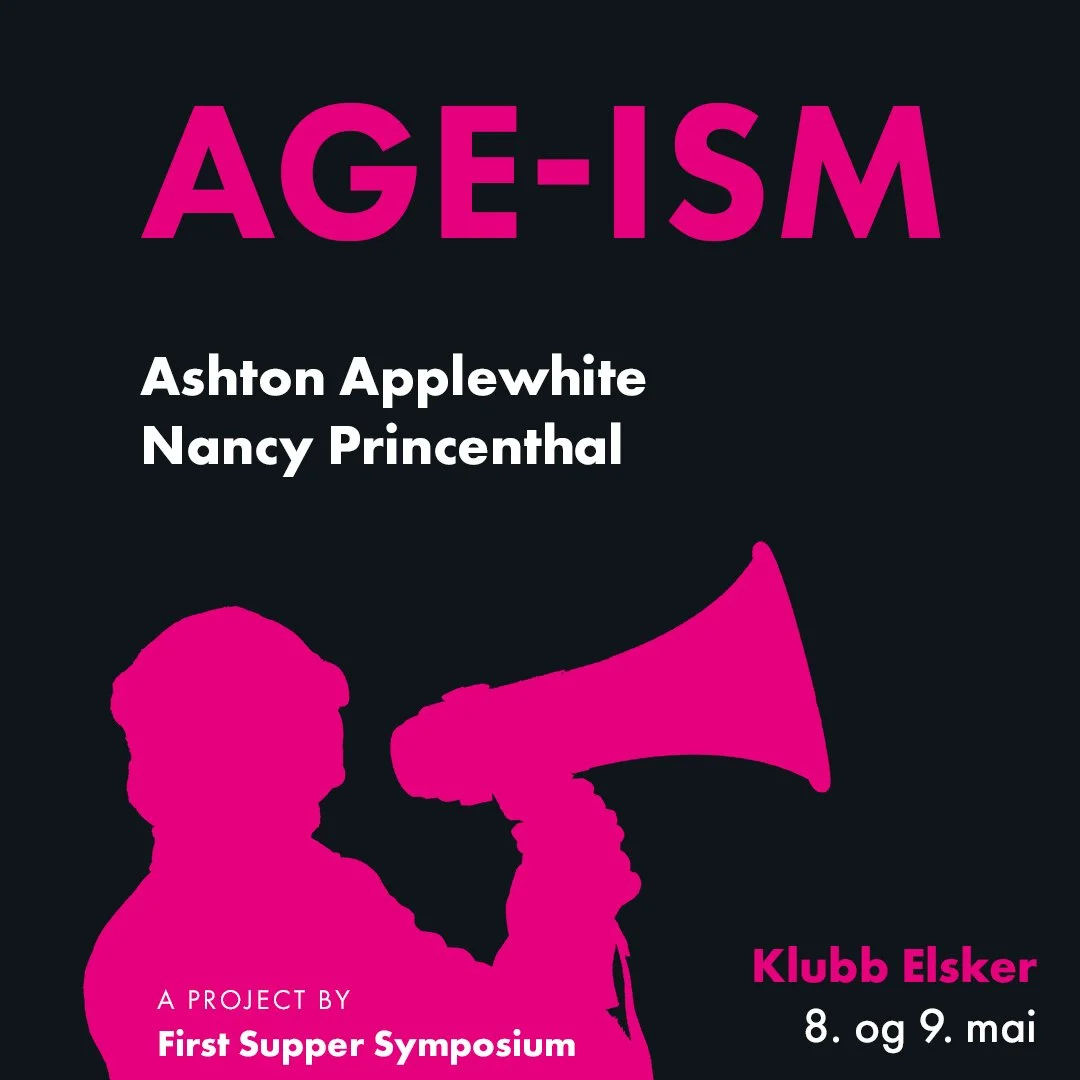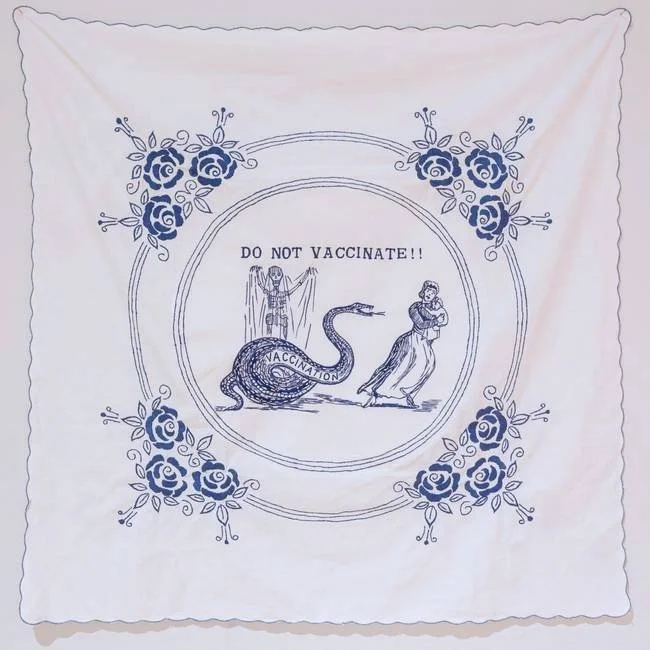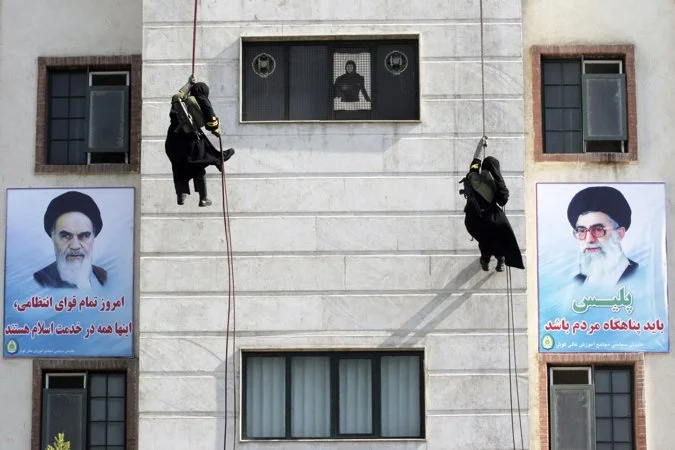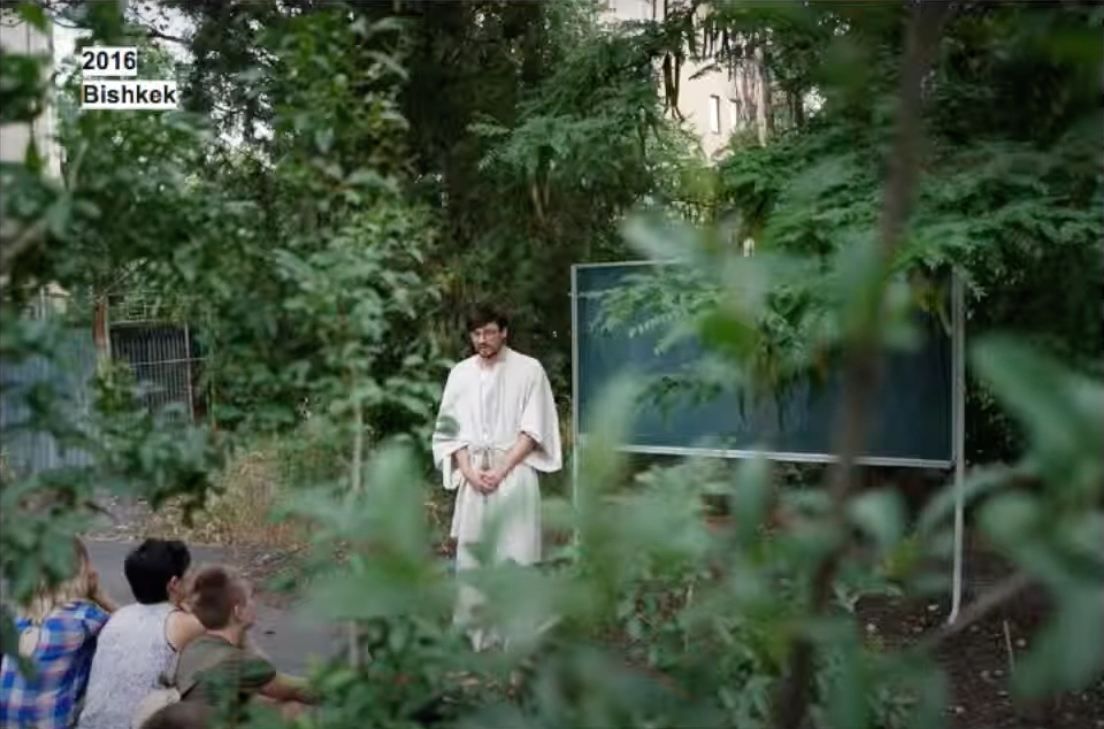Echoes of past – voice of the future, 2025
Forthcoming exhibition 30.08 – 07.09.2025. For more info and programme, scan the QR code.
100% human? – Art, activism and generative AI, 2025
100% human? – Art, activism and generative AI, organised by First Supper Symposium (FSS) in collaboration with OsloMet, will take place at Kunstnernes Hus cinema on 12 June 2025. The symposium raises key questions: How can artists and creatives respond to and influence the development of AI? In what ways does artificial intelligence reflect and reinforce different forms of discrimination? What potential does art activism have to engage with and intervene in this emerging technological field – and what possibilities lie ahead? The keynote speaker is the renowned Lynn Hershman Leeson, an artist who has explored technology-related issues for over six decades. Other contributors include practising artists, academics, intellectual property lawyers and creatives from Norway and abroad working with AI, machine learning, and technology. The programme also features collaborations with OsloMet, which serves as an advisor to the Norwegian government’s multi-billion-kroner AI initiative.
AGE-ISM, 2022
The Age-ism 2022 symposium organised by the First Supper Symposium examined age as a societal construct and power-related concept, focusing on the systemic marginalisation of older artists. Through a symposium held on May 8–9, 2022, in Oslo and performative events like the Catwalk Against Ageism, the initiative sought to dismantle age-related stereotypes and promote inclusivity in the arts.
The symposium featured discussions on ageism, inspired by gerontologist Robert Butler, who coined the term in 1969, and author Ashton Applewhite, whose keynote challenged myths about older individuals. It addressed ageism's disproportionate impact on women and freelance artists, particularly during the COVID-19 pandemic, which heightened economic instability in the gig economy.
Speakers included Nancy Princenthal on feminism and aging, Esra Duzen on exclusion, and Verdensrommet advocating for equitable conditions for immigrant artists. The event also emphasized intergenerational collaboration and artists' financial rights, highlighting disparities in pensions and economic stability.
The Catwalk Against Ageism, featuring models aged 5 to 75, brought these issues to attention through public engagement. Supported by various organisations, Age-ism 2022 aimed to foreground older artists’ potential, inspiring systemic change for a more equitable cultural sector.
PointCounterPoint, 2023
The PointCounterPoint exhibition at Oslo’s Intercultural Museum 02.11.2023–31.03.2024 explores the COVID-19 pandemic's political, social, and cultural aftermath through a variety of artworks, primarily in textile art. The exhibition reflects on isolation, resistance, and hope, tackling themes like protest movements, conspiracy theories, and personal struggles. It examines the pandemic not only as a collective trauma but also as a potential catalyst for societal transformation.
Featuring diverse perspectives from both established and emerging artists, PointCounterPoint uses art to critique societal responses to the pandemic while imagining alternative futures. The works balance raw emotion with critical inquiry, encouraging visitors to view the pandemic as both a shared experience and an opportunity for change.
Central to the exhibition is the question of whether such a profound disruption can inspire new ways of living. By situating the pandemic within a broader cultural and political framework, the exhibition prompts audiences to reconsider their roles in shaping post-pandemic society.
PointCounterPoint reinforces the Intercultural Museum’s commitment to inclusivity and critical dialogue. It offers a transformative space for processing the pandemic’s complexities and rethinking the possibilities for the future, highlighting the power of art to critique, heal, and inspire.
Prologue 1, 2016
The Prologue series, hosted by the First Supper Symposium in Oslo, investigated art activism through three events that explored critical themes, including public versus institutional art spaces, media strategies for activism, and transcultural feminist perspectives. By fostering dialogue between local and international voices, the series examined how art can confront systemic inequities while preserving its activist integrity.
Prologue 1: Art Activism – White Cube vs Public Space, held at the Museum of Cultural History, examined whether political art loses its activist edge when confined to institutional spaces, transforming into a marketable commodity. Prominent contributors tackled these tensions, blending diverse perspectives with incisive critique.
South African visual activist Zanele Muholi presented her photography addressing LGBTQ+ rights, including the self-portrait series Somnyama Ngonyama, highlighting the power of imagery in activism. Cultural critic Mikkel Bolt Rasmussen and curator Juan Puntes critiqued institutional co-optation while advocating grassroots initiatives. Norwegian theatre director Pia Maria Roll and artist Marius von der Fehr discussed Norway’s socio-political influences, and Ted Kerr examined HIV/AIDS activism’s representational challenges. Performance artist Kate Pendry and dancer Llewellen Mnguni added embodied perspectives on political narratives and resilience.
Moderated by Boel Christensen-Scheel, the event sparked lively discussions, continuing informally at Kunstnernes Hus. Prologue 1 laid a foundation for deeper explorations of activism in art.
Prologue 2, 2016
Prologue 2: Art and Media Activism – Strategies for Political Change explored the intersection of media and art activism, emphasizing the tension between utilizing media for visibility and resisting its commodification, echoing Audre Lorde’s idea that “the master’s tools will never dismantle the master’s house.” Hosted across Oslo’s cultural hubs, the event showcased diverse strategies for political change.
The Yes Men, represented by Mike Bonanno, demonstrated how satire and impersonation can expose corporate and governmental misconduct, while Sámi activist Eirik Myrhaug highlighted ecological activism and Indigenous rights. Deep Dish TV’s Brian Drolet and Ekaterina Sharova discussed grassroots media platforms amplifying marginalized voices, with Sharova critiquing Russian state-controlled media.
Shannon Jackson from Berkeley addressed how social practice art complicates oversimplified media narratives. Media Impact Moscow’s Tatiana Volkova and Pavlo Mitenko presented projects tackling censorship and advocating for minority rights. Moderator Trine Krigsvoll Haagensen guided these critical dialogues on the transformative potential of media-infused art activism.
Prologue 3, 2017
Prologue 3: Feminism and Art Activism Across Cultures facilitated a transcultural dialogue between Scandinavia and the Middle East, examining the intersections of feminism and art activism across diverse socio-political contexts. It challenged Western stereotypes of Middle Eastern women by highlighting their active roles as artists and activists.
Turkish-Norwegian filmmaker Nefise Özkal Lorentzen discussed her documentaries on gender and Islam and led a ManIslam workshop exploring masculinity and faith. Saudi artist Manal AlDowayan presented participatory projects like Tree of Guardians and Esmi-My Name, addressing societal norms in Saudi Arabia. Iranian poets Fatemeh Ekhtesari and Mehdi Mousavi shared personal experiences of censorship and exile.
Additional contributions included Lebanese filmmaker Mohamed Soueid’s exploration of gender in Cinema Fouad and Lamia Abi Azar’s work in drama therapy with marginalized communities. Danish curator Tone Olaf Nielsen and photojournalist Javad Parsa expanded discussions on feminist and decolonial activism.
Moderated by Marianne Bøe, the event emphasized collaboration, transcending cultural boundaries to foster nuanced understandings of activism through art.
First Supper Symposium, 2014
The 2014 First Supper Symposium, Feminist Performance Art, Activism, and Censorship, held at Chateau Neuf in Oslo, centred on feminist performance art, activism, and censorship, with Pussy Riot's Punk Prayer (2012) as a key case study. The event brought together prominent thinkers, artists, and activists to explore the implications of feminist art under political repression.
Feminist theorist Judith Butler examined the intersections of gender, LGBT rights, and political protests, while philosopher Rosi Braidotti discussed the role of women’s rock and punk bands in feminist movements. Ekaterina Sharova contextualized Pussy Riot within Russian contemporary art, and Viktor Misiano highlighted their actions within post-Soviet art activism. Pussy Riot members Nadezhda Tolokonnikova and Maria Alyokhina joined a panel moderated by Natalie Hope O'Donnell, fostering critical dialogue on feminist resistance and solidarity.
Complementary events included screenings of Goshka Macuga’s Non-Consensual Act and Milo Rau’s Die Moskauer Prozesse, alongside the Feminist Pencil exhibition at Galleri 69. The symposium also featured commissioned texts by Butler, Braidotti, and O'Donnell, to accompany the theoretical discussions.
Proceeds supported Zona Prava, a Russian prisoner rights organization, reinforcing the event’s activist ethos.
First Supper Symposium, 2013
The inaugural First Supper Symposium, held in Oslo in 2013, was a pioneering event that celebrated feminist art and fostered critical dialogue. It explored the intersections of art, feminism, and cultural identity, offering a platform for historical analysis, contemporary critique, and artistic expression. Moderated by Hannah Helseth, the symposium brought together an array of prominent international speakers, artists, and curators.
The event opened with a keynote by feminist art pioneer Judy Chicago, who reflected on her career and challenges overcoming institutional resistance. This was followed by presentations from art historian Andrew Perchuk and Norwegian artists Wenche Gulbransen, Camille Norment, Lotte Konow Lund, and A K Dolven. The second day began with a keynote from Dr. Elisabeth Sackler, founder of The Elizabeth Sackler Center for Feminist Art, and talks by Spanish curator Xabier Arakistain and Norwegian platform FRANK. Performances by Norwegian artist Ane Lan and presentations by David McCarthy and Will Bradley also took place.
The symposium concluded with artist statements by Eline McGeorge, Natalie Hope O'Donnell, and Kate Pendry, followed by a discussion led by Elizabeth Schei. Supported by institutions like Kunsthall Oslo and FRANK, the event established a vital platform for feminist art in Norway, marking a milestone in its cultural discourse.








